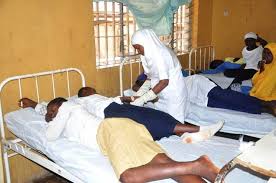Epidemiologists have confirmed the largest recent outbreak of cholera in Kano was linked to poor hand washing and environmental hygiene.
A total of 34 people died in the outbreak that affected 369 people in Kano between January and May.
A total 86 per cent of the cases of the infections were found in Government Secondary School, Dala.
Eight epidemiologists who studied the outbreak told a scientific conference on Tuesday that 70 per cent of stool samples collected in the school tested positive for Vibrio cholera, the germ that causes cholera.
Students affected were aged 14 on average: 33 of them both vomited and had diarrhoea; 26 of them had abdominal cramps.
Epidemiologists found students who didn’t contract the infection were more likely to have washed their hands with soap before eating, after using the toilet, used clean toilets, stored their water properly and had the least contact with individuals already having cholera.
The lack of basic hygiene, poor water storage, poor handwashing and environmental cleanliness all “aided transmission among students,” Aisha Faruk said at the 3rd Scientific Conference of the Nigeria Centre for Disease Control and the Nigeria Field Epidemiology and Laboratory Training Practice.
The study is also published in the abstracts of the conference.
In the wake of the outbreak, epidemiologists disinfected the environment, provided sanitary materials to the school, began sensitization on proper hygiene and recommended that the local government council send out environmental officers to regularly inspect the school.
The study didn’t identify the first case of cholera in the school, since an outbreak was already underway in the state, said Faruk, one of eight epidemiologists behind the study.
“We were notified late on the outbreak and the response was late. We couldn’t trace the index case but there was already confirmed outbreak of cholera in Kano”

 Join Daily Trust WhatsApp Community For Quick Access To News and Happenings Around You.
Join Daily Trust WhatsApp Community For Quick Access To News and Happenings Around You.


